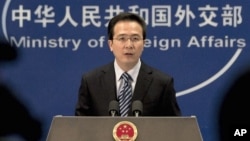China has lashed out at U.N. criticism of Beijing's handling of unrest in Tibetan areas, where there have been frequent self-immolations and other protests.
Foreign Ministry spokesman Hong Lei said Monday that self-immolations have been instigated by exiled Tibetan spiritual leader, the Dalai Lama, and are used to encourage people to engage in "separatist" activities. Hong called the use of people for a political aim "unconscionable."
The Dalai Lama says he opposes all violence.
U.N. Human Rights Chief Navi Pillay urged Chinese authorities Friday to better address grievances expressed by Tibetans and allow independent monitors to visit the region.
Many Tibetans accuse Beijing of repressing their religion and undermining their culture, as China's majority Han ethnic group increasingly relocates into historically Tibetan areas. Dozens of ethnic Tibetans have set themselves on fire since March of 2011 and many have called for the return of the Dalai Lama. The Tibetan government in exile is based in Dharamsala, India.
Foreign Ministry spokesman Hong Lei said Monday that self-immolations have been instigated by exiled Tibetan spiritual leader, the Dalai Lama, and are used to encourage people to engage in "separatist" activities. Hong called the use of people for a political aim "unconscionable."
The Dalai Lama says he opposes all violence.
U.N. Human Rights Chief Navi Pillay urged Chinese authorities Friday to better address grievances expressed by Tibetans and allow independent monitors to visit the region.
Many Tibetans accuse Beijing of repressing their religion and undermining their culture, as China's majority Han ethnic group increasingly relocates into historically Tibetan areas. Dozens of ethnic Tibetans have set themselves on fire since March of 2011 and many have called for the return of the Dalai Lama. The Tibetan government in exile is based in Dharamsala, India.





